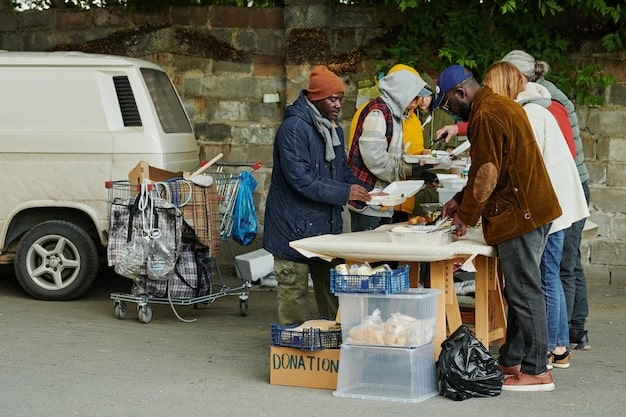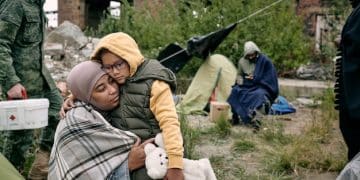How to Volunteer Effectively in Humanitarian Relief as a US Citizen

US citizens can effectively volunteer in humanitarian relief efforts by identifying reputable organizations, undergoing proper training, leveraging their skills, respecting local cultures, and maintaining realistic expectations to provide meaningful support.
When disaster strikes or humanitarian crises unfold, the desire to help can be overwhelming. For how can US citizens volunteer effectively in humanitarian relief efforts? The answer lies in preparation, informed action, and a commitment to making a real difference.
Understanding Humanitarian Relief Efforts
Humanitarian relief efforts are organized responses to crises, whether natural disasters, conflicts, or public health emergencies. They aim to alleviate suffering, protect lives, and restore normalcy to affected communities. But simply showing up isn’t enough. To be truly effective, understanding the landscape is crucial.
Effective humanitarian aid requires coordination, expertise, and a deep understanding of the affected region’s culture and needs. Volunteers play a vital role, but their impact is maximized when they are well-prepared and contribute meaningfully.
The Scope of Humanitarian Crises
Humanitarian crises come in many forms, each with unique challenges. From earthquakes and hurricanes to famine and war, the scale and complexity of these events demand a multifaceted response. Understanding the scope gives context to your volunteer journey.
The Role of Volunteers
Volunteers are the backbone of many humanitarian organizations, providing essential support in areas like logistics, medical assistance, community outreach, and more. Their contributions help extend the reach of aid and ensure that resources reach those who need them most.
- Direct Assistance: Providing food, water, and shelter to affected populations.
- Medical Support: Offering first aid, medical care, and public health services.
- Logistics and Coordination: Helping to manage supplies, transport resources, and coordinate relief efforts.
- Community Outreach: Communicating with affected communities, providing information, and offering emotional support.
In conclusion, effective volunteering starts with understanding the nature of humanitarian crises and the different ways volunteers can contribute. Being aware of the scope and the diverse roles available allows US citizens to better prepare and make a meaningful impact when volunteering in relief efforts.

Choosing the Right Organization
Selecting the right humanitarian organization is paramount. It’s essential to align your skills and interests with the organization’s mission and the needs of the crisis. Thorough research helps ensure your time and effort are well-spent.
A reputable organization provides structure, training, and ethical guidelines, ensuring that your contributions are effective and aligned with the best practices in humanitarian aid.
Researching Organizations
Before committing to an organization, examine its mission, track record, and financial transparency. Look for organizations with a clear focus on the type of crisis you want to address and a history of successful interventions.
Evaluating Credibility
Credible organizations are transparent about their operations, finances, and partnerships. Check their ratings on platforms like Charity Navigator and GuideStar to assess their accountability and effectiveness.
- Mission Alignment: Does the organization’s mission align with your values and interests?
- Transparency: Does the organization provide clear information about its finances and operations?
- Accountability: Is the organization accountable to its donors and the communities it serves?
- Track Record: What is the organization’s history of successful interventions in humanitarian crises?
In conclusion, choosing the right organization involves careful research and evaluation. By aligning your skills and interests with a reputable organization, you can ensure that your volunteer efforts are effective, ethical, and contribute to positive outcomes in humanitarian relief.
Preparing Before You Go
Preparation is key to effective volunteering. This includes acquiring relevant training, understanding the cultural context, and packing appropriately.
Proper preparation equips you with the skills and knowledge to navigate challenging situations, respect local customs, and contribute meaningfully to the relief effort.

Essential Training
Consider certifications in first aid, CPR, or disaster preparedness. These skills can be invaluable in crisis situations and enhance your ability to provide assistance.
Cultural Sensitivity
Understanding the cultural norms and customs of the affected region is crucial for building trust and working effectively with local communities. Research the local culture and be respectful of their traditions and beliefs.
- Language Skills: Learning basic phrases in the local language can greatly enhance communication and rapport.
- Local Customs: Understanding local customs and traditions helps avoid misunderstandings and build trust.
- Dress Code: Adhering to the local dress code shows respect for the local culture.
- Dietary Considerations: Being aware of dietary restrictions and preferences ensures you can participate in shared meals and cultural events.
In conclusion, preparing before you go involves acquiring essential training and developing cultural sensitivity. By equipping yourself with the necessary skills and knowledge, you can navigate challenging situations, respect local customs, and contribute effectively to humanitarian relief efforts.
Effective On-the-Ground Strategies
Once on the ground, your effectiveness depends on your adaptability, communication skills, and commitment to teamwork. Approach each task with humility and a willingness to learn.
Collaboration with local communities, clear communication, and adaptability are essential for navigating the complexities of humanitarian relief operations and making a meaningful impact.
Communicating Effectively
Clear and respectful communication is essential, especially when language barriers exist. Use simple language, listen actively, and be patient. Consider using visual aids or working with translators to ensure understanding.
Working with Local Communities
Engage with local leaders and community members to understand their needs and priorities. Their insights are invaluable in designing and implementing effective relief programs. Working in partnership with the community fosters trust, cultural sensitivity, and respect.
- Active Listening: Listen attentively to the concerns and needs of local community members.
- Respectful Dialogue: Engage in respectful dialogue and avoid making assumptions.
- Collaboration: Collaborate with local leaders and community members in decision-making processes.
- Empowerment: Empower local communities to take ownership of relief and recovery efforts.
In conclusion, effective on-the-ground strategies hinge on clear communication and collaboration with local communities. By engaging with empathy, respect, and a willingness to learn, you can contribute meaningfully to humanitarian relief efforts and help foster sustainable recovery.
Leveraging Your Unique Skills
Everyone has unique skills and talents that can be valuable in humanitarian relief efforts. Identify your strengths and find ways to apply them effectively.
Adaptability is also key. Be open to taking on different roles as needed, and be willing to learn new skills on the fly.
Identifying Your Strengths
Are you a skilled communicator, a trained medical professional, or a logistical expert? Understanding your strengths allows you to contribute meaningfully and efficiently.
Applying Skills Effectively
Don’t be afraid to step outside your comfort zone, but also recognize your limitations. Focus on tasks where your skills can have the greatest impact. Leverage language skills, technical knowledge, and personal experiences to address specific challenges in the relief effort.
- Medical Skills: Medical professionals can provide essential healthcare services.
- Technical Skills: Engineers and technicians can assist with infrastructure repairs and maintenance.
- Communication Skills: Skilled communicators can help disseminate information and build trust with affected communities.
- Logistical Skills: Logistical experts can streamline the distribution of supplies and resources.
In conclusion, leveraging your unique skills is essential for effective volunteering in humanitarian relief. By identifying your strengths and applying them strategically, you can maximize your impact and contribute meaningfully to the relief effort.
Long-Term Commitment and Sustainability
Humanitarian relief is not just about immediate aid; it’s also about long-term recovery and sustainability. Consider how you can contribute to lasting change.
Supporting long-term projects and promoting community resilience are crucial for helping communities recover from crises and build a better future.
Supporting Long-Term Projects
Many organizations have long-term development projects aimed at rebuilding communities and promoting self-sufficiency. Consider supporting these initiatives through continued volunteering or financial contributions.
Volunteering, mentorship, and ongoing training and education empower local communities to take control of their futures.
Promoting Community Resilience
Resilient communities are better equipped to withstand future crises. Support initiatives that promote community empowerment, disaster preparedness, and sustainable development.
- Economic Development: Invest in programs that promote economic growth and create job opportunities.
- Education and Training: Support educational initiatives and job training programs to empower individuals.
- Infrastructure Development: Contribute to the rebuilding of essential infrastructure, such as schools, hospitals, and transportation networks.
- Environmental Sustainability: Promote sustainable practices to protect the environment and ensure long-term resource availability.
In conclusion, a long-term commitment and focus on sustainability are essential for effective humanitarian relief. By supporting long-term projects and promoting community resilience, you can help communities recover from crises and build a better future for themselves.
| Key Point | Brief Description |
|---|---|
| ✅ Organization | Choose reputable and transparent organizations. |
| 📚 Preparation | Get training and understand local cultures. |
| 🤝 Collaboration | Work with local communities and leaders. |
| 💪 Skills | Leverage your unique abilities effectively. |
[FAQ]
▼
Research organizations thoroughly, checking their mission, transparency, and ratings on platforms like Charity Navigator and GuideStar before committing your time or resources.
▼
Consider certifications in first aid, CPR, or disaster preparedness. These can be invaluable in crisis situations and enhance your ability to provide effective assistance.
▼
Cultural sensitivity is crucial. Understanding and respecting local customs and traditions can help you build trust and work effectively with local communities affected by crises.
▼
Medical skills, technical expertise, communication abilities, and logistical knowledge are all valuable. Identify your strengths and find ways to use them effectively. Flexibility is key.
▼
Support long-term development projects aimed at rebuilding communities. Promote community empowerment, disaster preparedness, and sustainable development for lasting change and resilience in the face of future crises.
Conclusion
Volunteering in humanitarian relief efforts can be a deeply rewarding experience. By preparing thoroughly, choosing the right organization, and committing to long-term sustainability, how can US citizens volunteer effectively in humanitarian relief efforts? They truly can make a tangible difference in the lives of those affected by crises, embodying the spirit of compassion and global citizenship.





